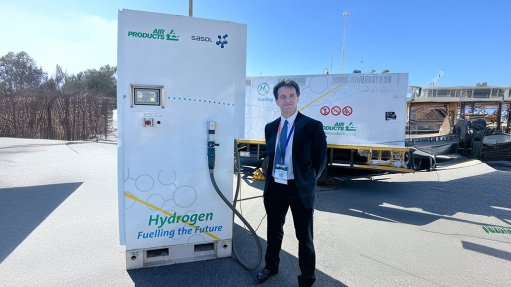Labour Relations Act amendments could cripple auto industry
Changes to the Labour Relations Act (LRA), which came into force in January, could impact negatively on the profitability of manufacturing companies in the automotive industry, says business law and litigation firm Fasken Martineau labour, employment and human rights partner Ludwig Frahm-Arp.
The amendments stipulate that, when an individual has been employed through a labour broker and has been working at a company for longer than three months, the employer must offer the individual terms and conditions that are no less favourable than those provided to an individual employed by the company who performs the same function.
Frahm-Arp explains to Engineering News that many automotive industry employers use labour brokers, as the industry – which comprises original- equipment manufacturers as well as companies in the supply chain – is prone to peaks and troughs in terms of production demand.
“Many of these companies have used labour brokers for a long time and have a different rate of remuneration for employees secured through labour brokers. Before the new amendments, labour brokers were able to engage with automotive manufacturers and offer them labour at a lower rate,” he explains.
The automotive industry is regulated by the Motor Industry Bargaining Council, which stipulates the minimum terms and conditions of employment, as well as the minimum rates of pay.
Frahm-Arp notes that the amendments require the remuneration of labour-brokered employees to be no less favourable than that of an employee of the automotive company.
However, this means that the cost of employment will increase significantly once the amendments come into effect, which is problematic because of South Africa’s low productivity level.
Frahm-Arp highlights a global manufacturing competitiveness report, completed in 2013 by professional services firm Deloitte, which investigates the productivity of countries, including Thailand, India and South Africa.
“The report highlights that the South African automotive industry is far less productive than the industries in India and Thailand. Therefore, if the base manufacturing costs increase, while productivity remains at the current low levels, the profitability of the local automotive industry will be seriously undermined. This could ultimately result in the South African automotive industry losing work to more productive nations,” he warns.
Before 1994, the South African automotive industry manufactured vehicles that were for sale within the country’s borders. Frahm-Arp says if South Africa loses its automotive manufacturing capabilities, the country’s economy is likely to suffer a major blow.
“Many companies in the metal and manufacturing industry argue that the motor industry is one of the key manufacturing industries in the country and, if we lose that, our manufacturing capabilities in other industries will be severely diminished as well,” he says.
Frahm-Arp suggests that collective bargaining between trade unions and employers might offer a platform, enabling trade unions to secure fair wages for employees. It could also provide a forum for manufacturing companies to address productivity concerns.
He explains that the amended LRA makes provision for temporary services, stating that an employee is deemed to be providing a temporary service only when the service rendered does not exceed three months, in which case the employee is not entitled to equal remuneration.
“It can, therefore, be agreed that certain services, through collective bargaining are deemed temporary. “However, whether unions will agree that certain services are temporary, even if the service is provided for longer than three months, is debatable. I believe this is unlikely, as the automotive sector is one of the areas targeted by unions to remove labour brokers,” Frahm-Arp notes.
The Labour Relations Amendment Act was gazetted in August last year and came into effect in January. There is a three-month grace period whereby employers can address the manner in which they engage with labour brokers and employ employees on fixed-term contracts.
Comments
Press Office
Announcements
What's On
Subscribe to improve your user experience...
Option 1 (equivalent of R125 a month):
Receive a weekly copy of Creamer Media's Engineering News & Mining Weekly magazine
(print copy for those in South Africa and e-magazine for those outside of South Africa)
Receive daily email newsletters
Access to full search results
Access archive of magazine back copies
Access to Projects in Progress
Access to ONE Research Report of your choice in PDF format
Option 2 (equivalent of R375 a month):
All benefits from Option 1
PLUS
Access to Creamer Media's Research Channel Africa for ALL Research Reports, in PDF format, on various industrial and mining sectors
including Electricity; Water; Energy Transition; Hydrogen; Roads, Rail and Ports; Coal; Gold; Platinum; Battery Metals; etc.
Already a subscriber?
Forgotten your password?
Receive weekly copy of Creamer Media's Engineering News & Mining Weekly magazine (print copy for those in South Africa and e-magazine for those outside of South Africa)
➕
Recieve daily email newsletters
➕
Access to full search results
➕
Access archive of magazine back copies
➕
Access to Projects in Progress
➕
Access to ONE Research Report of your choice in PDF format
RESEARCH CHANNEL AFRICA
R4500 (equivalent of R375 a month)
SUBSCRIBEAll benefits from Option 1
➕
Access to Creamer Media's Research Channel Africa for ALL Research Reports on various industrial and mining sectors, in PDF format, including on:
Electricity
➕
Water
➕
Energy Transition
➕
Hydrogen
➕
Roads, Rail and Ports
➕
Coal
➕
Gold
➕
Platinum
➕
Battery Metals
➕
etc.
Receive all benefits from Option 1 or Option 2 delivered to numerous people at your company
➕
Multiple User names and Passwords for simultaneous log-ins
➕
Intranet integration access to all in your organisation


















